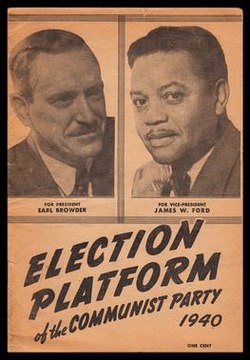James William Ford, December 22, 1893 (Pratt City, Ala.) – June 21, 1957 (New York, NY)
VP candidate for Communist Party USA (1932, 1936, 1940)
Running mate with nominee (1932): William Z. Foster (1881-1961)
Running mate with nominee (1936, 1940): Earl R. Browder (1891-1973)
Popular vote (1932): 103,307 (0.26%)
Popular vote (1936): 79,315 (0.17%)
Popular vote (1940): 48,557 (0.10%)
Electoral vote (1932, 1936, 1940): 0/531
The campaign (1932):
In an era when thousands of Americans were moving to the Soviet Union, the newly renamed Communist Party USA had their best opportunity to recruit new members.
Pro-Stalinist William Z. Foster was nominated for his third presidential run, with James W. "Jim" Ford as his running mate.
Although Ford is frequently touted as "the first African American to run for a presidential ticket in U.S. history," that is not entirely true although he was the first to be on a ticket where a significant number of votes were recorded from numerous state ballots. But we cannot ignore Frederick Douglass (Equal Rights Party 1872), William Thomas Scott/George Edwin Taylor/William C. Payne (National Negro Liberty Party 1904), and Simon Peter William Drew (Interracial Independent Political Party 1928).
It is true that the CPUSA was one the first political parties to be integrated and denounce segregation, but it was still demographically a very white party.
The 1932 CPUSA platform called for a United States of Soviet America and summarized itself with six points:
1. Unemployment and social insurance at the expense of the state and employers. 2. Against Hoover's wage-cutting policy.
3. Emergency relief for the impoverished farmers without restrictions by the government and banks; exemption of impoverished farmers from taxes, and no forced collection of rents or debts.
4. Equal rights for the Negroes and self-determination for the Black Belt.
5. Against capitalist terror; against all forms of suppression of the political rights of the workers.
6. Against imperialist war; for the defense of the Chinese people and of the Soviet Union.
On Sept. 8 Foster suffered a major heart attack on the campaign trail in Illinois which was followed by a mental breakdown. After the election he went to the USSR to recover, not returning to the US until 1934.
1932 would be the high point for the CPUSA at the presidential ballot box with a final national result of 0.26%, landing in a very distant 4th place. They were an option for voters in 39 states, with their best showing being Montana (0.82%) where in Sheridan County they polled 17.74%.
The campaign (1936):
Earl Browder, a less militant leader of CPUSA than his rival Foster, had stepped into a leadership role after the latter had been sidelined by his failing health. Browder was more willing to work the system and made overtures to the Socialists and other groups to form a united front for pro-labor and anti-fascist activities. Supposedly Browder even offered to be the running mate with Socialist Norman Thomas in 1936.
With votes recorded in 35 states their best showing was in New York (0.64%) and California (0.41%). In some states their popular vote was in single or double digits.
The campaign (1940):
The Nazi-Soviet pact of August, 1939 had seriously undermined the CPUSA's anti-fascist rhetoric and the Party began to lose members, especially artists, writers, and intellectuals who had signed up in the early 1930s. On top of that, presidential nominee Browder had been tried and convicted of passport fraud in 1940, and during the campaign was free while the case was being appealed, which didn't turn out so well for him. He began his 14-month prison sentence in March, 1941.
On the ballot in 23 states, their strongest finish was in California (0.42%).
The CPUSA would not appear on the presidential ballot again until 1968.
Election history:
1930 - US House of Representatives (NY) (Communist Party USA) -
defeated
1934 - US House of Representatives (NY) (Communist Party USA) -
defeated
Other occupations: blacksmith's helper, machinist's helper, blast furnace laborer, US Signal Corps in France during WWI, mattress factory worker, Post Office worker, author
Buried: cremated
Notes:
First person to run as a third party VP three times.
Attended Fisk University
Joined the Workers (Communist) Party of America in 1926.
In Moscow and Hamburg as an open Communist agent in 1928-1930
In Spain supporting the Republicans in the Spanish Civil War, 1937.
Demoted from his executive position in CPUSA in 1944-1945 due to his association with Earl
Browder, who had been expelled from the Party.
When Ford was young, his grandfather had been burned alive by white mob.
Born James William Foursche "with the accent on the last syllable."























